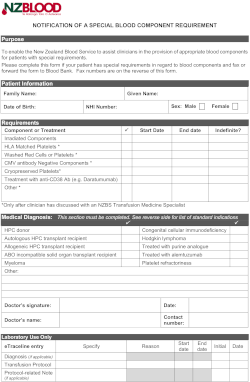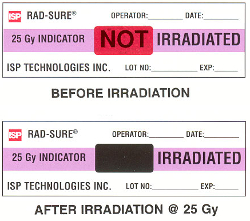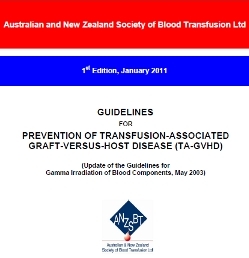Blood components that contain cells (whole blood units, red cell units, platelet units and granulocyte units) can rarely cause a condition known as Transfusion-Associated Graft-vs-Host Disease (TA-GVHD). This occurs in patients with certain immune predispositions or in patients with a similar tissue type to the donor. The disorder is prevented by giving the units a low-dose of irradiation.
ANZSBT guidelines (2024) recommend irradiation for the following patients. Note that certain indications are controversial and the consultant caring for the patient may not agree with all indications listed below.
Definite Indications
- Allogeneic and Autologous Bone Marrow/PBSC Transplant recipients
- Congenital Cellular Immunodeficiency Disorders
- Intrauterine and all subsequent transfusion and neonatal exchange transfusions
- Hodgkin's Disease
- Patients receiving purine analogues with associated immunosuppression e.g. fludarabine, pentostatin, cladribine, clofarabine and bendamustine
- Patients receiving alemtuzumab for malignant or non-malignant disorders and transplantation
- Dedicated [directed] donations (from blood relatives)
- HLA matched single donor platelets
- Granulocyte transfusions
If unsure about other possible indications please see the ANZSBT guidelines or contact Blood Bank.



Red cells contain various protein-carbohydrates and lipid-carbohydrate molecules that the immune system can recognise. Molecules that the immune system recognises are called antigens.
If your patient has antibodies to red cells, please contact Blood Bank to discuss when blood is needed and how long it will take Blood Bank to provide it. Blood has to be matched specifically and this may require further testing of the patient as well as testing of red cell units. Units may have to be fetched from other parts of the country, or even donors called in specially.
CMV infection is a recognised complication of transfusion. For most people,
CMV infection is a minor viral illness. Certain immunosuppressed patients are at
increased risk of complications of CMV infection. However NZBS leucodepletes all
blood components so this risk is minimised.
However, for a
very few indications, blood that is leucodepleted and CMV negative is provided if
requested.
The only standard indication is intrauterine or neonatal transfusion. CMV negative components will continue to be provided for individual patients following
discussion and agreement between the specialist responsible for the patient's care and a member of the NZBS medical team.
More Info